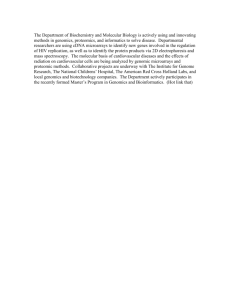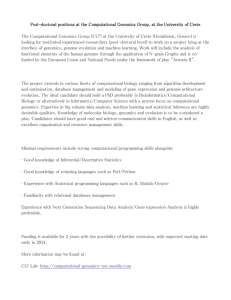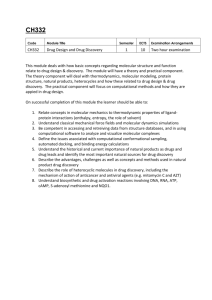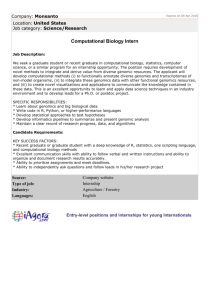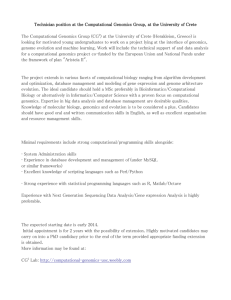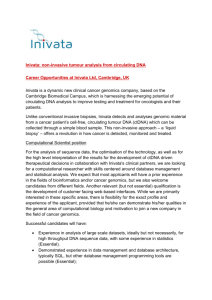Optical Mapping of E
advertisement
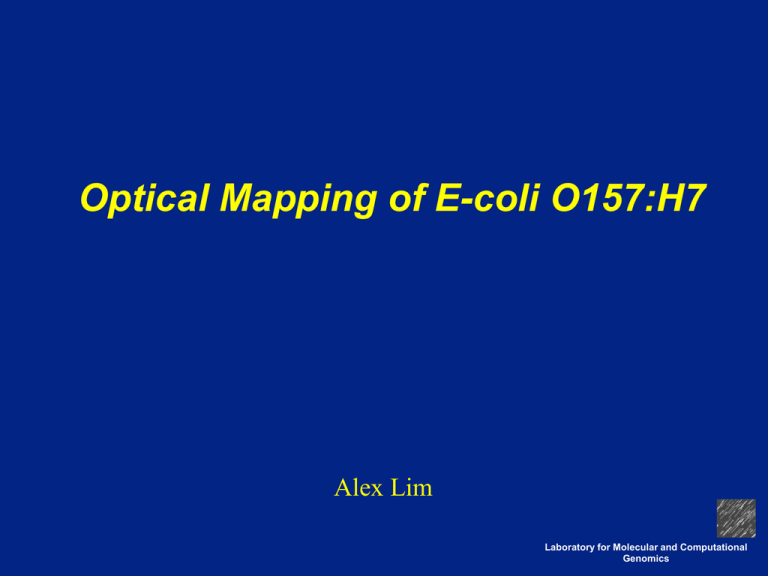
Optical Mapping of E-coli O157:H7 Alex Lim Laboratory for Molecular and Computational Genomics Physical Maps •Determine the relative position of landmarks along a genome segment •Used as a basis for DNA sequencing and for the isolation and characterization of genes Laboratory for Molecular and Computational Genomics Laboratory for Molecular and Computational Genomics How Optical Mapping Works DNA molecule is extended and aligned on surface. Restriction enzymes cut the DNA molecule into fragments. Laboratory for Molecular and Computational Genomics Laboratory for Molecular and Computational Genomics 7 terabytes of raided storage! Laboratory for Molecular and Computational Genomics Optical Mapping • Uses fluorescence microscopy to create physical maps by directly imaging individual surface bound DNA molecules after cleavage by restriction enzymes • Advantages: solves the problem of determining fragment order small amounts of starting material easy to automate and high throughput offers information of the structural organization of genomes Laboratory for Molecular and Computational Genomics Single Molecule Optical Maps are Imperfect Four major errors: 1. False negatives (missing restriction sites as a result of partial digestion); 2. False positives (spurious cuts not from enzymatic actions); 3. Sizing errors; 4. Loss of small fragments These issues are dealt with by Gentig Laboratory for Molecular and Computational Genomics Laboratory for Molecular and Computational Genomics Optical Mapping of E. coli O157 •Produces shiga like toxin Causes hemolytic uremic syndrome (HUS) and hemorrhagic colitis •Causes over 100,000 illness anually in US •Sequenced by Blattner’s Group Perna, N.T., et al., Genome sequence of enterohaemorrhagic Escherichia coli O157:H7. Nature, 2001. 409(6819): p. 529-33 Laboratory for Molecular and Computational Genomics Genomic DNA molecule from E.coli O157 Laboratory for Molecular and Computational Genomics E. coli O157:H7 • 50x coverage • Mapped with Xho I and Nhe I • Very little editing required due to system and algorithmic improvements Sequence Laboratory for Molecular and Computational Genomics Results of E. coli O157 •A total of 494 molecules of O157 genomic DNA were analyzed •251 molecules went into the final contig, 58% by mass, providing 30 coverage •166 Mb of total DNA analyzed •Average fragment size generated by XhoI 25.1 kb •The genome size was calculated to be 5.53 Mb Laboratory for Molecular and Computational Genomics A comprehensive overview of OM accuracy Laboratory for Molecular and Computational Genomics
